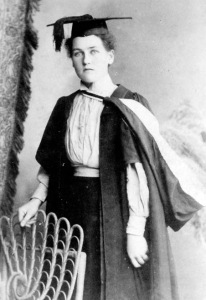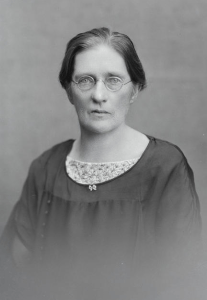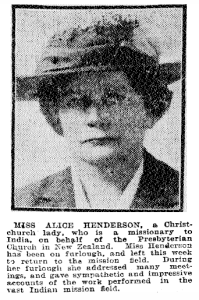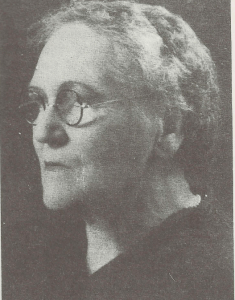We celebrate the 130th year of women's suffrage in New Zealand with a series of posts about local suffrage campaigners.
The women’s suffrage movement in New Zealand was closely associated with the temperance movement, and also had a religious and moral dimension. The stories of the Henderson sisters highlight these themes well.
The Hendersons were quite the family, producing four signatories of the Women’s Suffrage Petition, three of whom were also notable suffragists. In total there were 7 girls and 2 boys in Daniel and Alice’s brood. G R Macdonald, of dictionary fame, describes them thus:
"The Henderson family, particularly the women, were distinguished by good looks, high-class brains, and a strong urge to help their fellow men. They were all strongly radical in outlook."
Daniel was from Scotland and Alice from Ireland, and the young couple, who had married in 1859, moved to Australia shortly after where their first children were born. The family then relocated to New Zealand in 1863 shifting from place to place – Auckland, Tauranga, Kaiapoi and Ashburton before finally settling in Christchurch around 1882. The 9 siblings were:
- Alice Eleanor Henderson (1860 – 1952)
- Christina Kirk Henderson (1861 – 1953)
- Dorothea Jane Robinson (1863 – 1953)
- Evangeline Matthew (1864 – 1951)
- James Henderson (1865 – 1953)
- Kathleen Carter (1869 – 1967)
- Stella May Allan (1871 – 1962)
- Elizabeth Reid McCombs (1873 – 1935)
- Alexander Gunn Henderson (1875 – 1960)
While Elizabeth McCombs is the most famous of the siblings, Christina and Stella are also notable, as is the eldest child Alice who was a missionary in India for many years.
Christina and Stella have biographies on Te Ara and on Wikipedia which document, respectively, Christina’s work in education and her long association with education and organisations like the National Council of Women, Presbyterian Women's Missionary Union and the Women’s Christian Temperance Union; and Stella’s pioneering work in law and journalism and as an alternate delegate to the League of Nations for Australia.
The family were staunchly Presbyterian and this heavily influenced their upbringing and beliefs. Alice’s missionary work in particular seems to have influenced Christina and the organisations she joined. Indeed, after Alice’s retirement in 1932 the two lived in a mission house in Sumner for the rest of their lives. Alice began her missionary work in Madras in 1892 under the church of Scotland, setting up a girls’ school and teaching them lacework. In 1909 she joined the New Zealand Presbyterian Mission in the Punjab, again opening a girls’ school. During the First World War she worked at a leper hospital. When on furlough back in New Zealand she lectured around the country about her work.
I suppose it feels a little odd these days that such radical women were so closely associated with temperance – which came from genuine, if paternalistic, concerns about the demon drink – and missionary work, which any way you look at it is pretty racist really. When commenting on the political situation in India in 1921 Alice states:
“No one who thinks sanely imagines that India is in a position to govern herself” Otago Daily Times, 12 January 1921, p4
Ouch. Not at all a progressive missionary position.
Getting the vote was so incredibly important, but at the same time the campaign came with the baggage and attitudes of the Victorian age. This is why intersectionality is such a valuable lens – ensuring that we look at gender, race, class, sexuality together to make sure no area is being left behind.
So at the moment I’m feeling ambivalent about the Hendersons – on the one hand they’re great and pioneering, and on the other hand they are very much of their time. Indeed, as this article discusses, by 1917 Stella displays a rather snobbish attitude to some women voters:
“I think [universal women’s suffrage] has proved a mistake in Australia…a large proportion of our women are incapable of voting intelligently.” Vesta, 1917,14 February, page 12
Ultimately, let’s not forget those who paved the way for us, even if we don’t always agree with them.






Add a comment to: The Henderson Sisters: suffragists, missionaries and Presbyterians